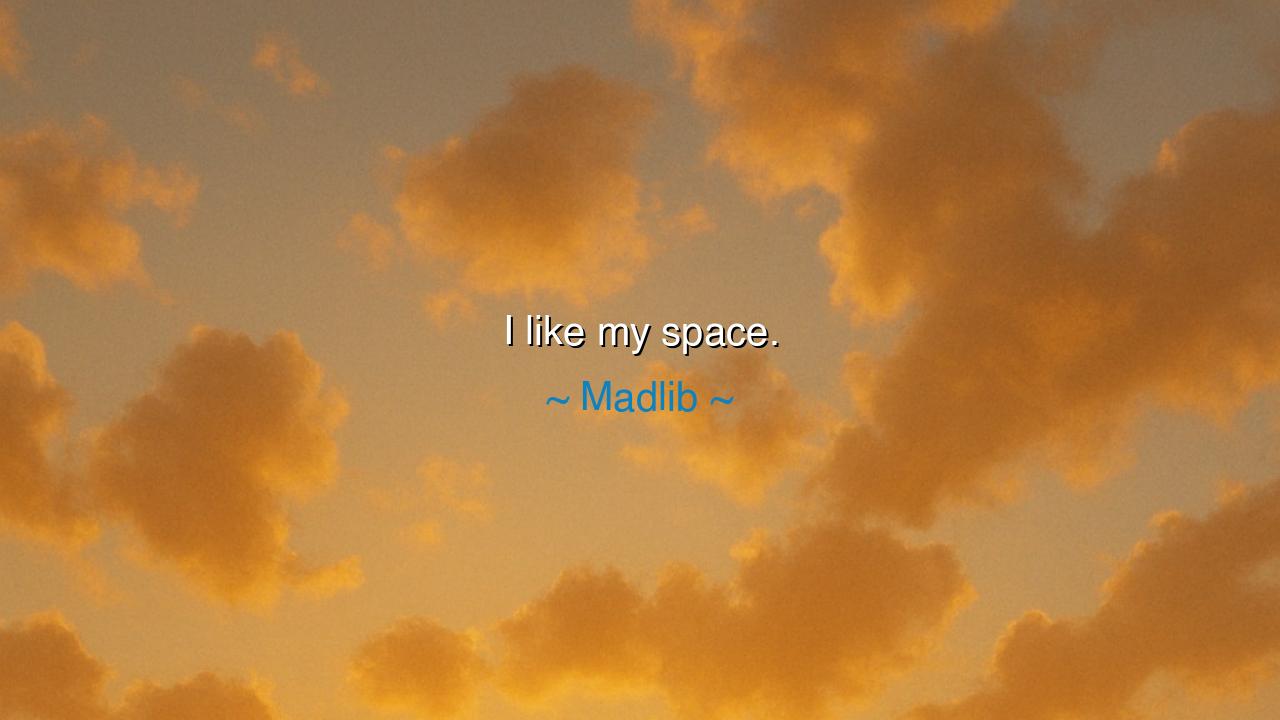
I like my space.






In the delicate weave of life, where every soul dances to the rhythms of its own existence, there are few things more profound than the need for personal space. The words of Madlib, a modern sage of sound, capture this truth with a simple declaration: “I like my space.” These few words speak to a timeless truth that ancient wisdom has long revered—the need for individuality, for quietude, for the space in which one can reflect, create, and simply be. It is a call to step away from the clamor of the world, to carve out moments of solitude where the mind can roam free, unfettered by external demands. Madlib, though a master of music, is also a seeker of inner peace—recognizing that to find clarity in the world, one must first find clarity within.
The ancients, in their pursuit of wisdom, often spoke of the power of space—not in the physical sense of vast land or empire, but in the mental and spiritual realms. Socrates, the great philosopher, spent much of his life seeking to understand the soul and the nature of existence. Yet, his greatest wisdom was found not in the bustling markets of Athens, but in the quiet corners of his mind, where he could ask profound questions and listen for answers from within. Madlib’s words echo this sentiment, acknowledging that without the space to reflect, to understand, and to create, the mind is left adrift in a sea of noise and distraction.
The need for space is also echoed in the practices of the great monks and ascetics of ancient traditions. The Buddhists, for instance, sought seclusion not to escape the world, but to better understand it. The monasteries of the Middle Ages were built as sanctuaries where the mind could find stillness and the soul could focus on higher truths. These spiritual practices were built upon the understanding that the world outside is full of noise—yet in the stillness, in the space between thoughts and actions, clarity can be found. In this way, Madlib’s “I like my space” becomes a modern mantra for those seeking the same peace and freedom that the ancients sought in their own solitude.
Consider the story of Leonardo da Vinci, whose genius transcended his time. Leonardo was a man of action—painting, inventing, and dreaming of a future that only his mind could imagine. Yet, his creativity was not born from constant interaction with others, but from the quiet moments of solitude in his workshop, where he could explore the depths of his thoughts without interruption. For Leonardo, as for Madlib, space was the canvas upon which his ideas took root and flourished. The lessons of Leonardo remind us that true creation, whether it is in art, science, or music, requires an environment of freedom—a space where the mind is allowed to roam and explore without the constraints of external noise.
There is also the example of Albert Einstein, whose mind constantly sought the mysteries of the universe. His groundbreaking work in physics was the product of countless moments spent in solitary thought, in spaces where he could delve into the deepest corners of his imagination. Einstein once said, "Imagination is more important than knowledge," a testament to the fact that great ideas are born not from constant interaction with the world, but from the quiet, contemplative space where the mind is allowed to freely explore. For both Einstein and Madlib, the act of creating required the inner space to connect deeply with their own thoughts and inspirations.
The lesson we learn from Madlib’s simple declaration is clear: without space, we cannot truly know ourselves. In a world that demands constant activity, movement, and engagement, it is all too easy to forget the importance of retreat, of quiet, of those moments where we can simply be alone with our thoughts. This space is where creativity is nurtured, where the soul is restored, and where we find the clarity needed to navigate the complexities of life. Just as the ancients knew that true wisdom comes from within, so too must we seek the time and place to listen to the inner voice that guides us.
In our own lives, we must take heed of this wisdom. We must carve out moments of space, whether through physical solitude or through moments of mental stillness, to reconnect with ourselves. Madlib’s message is a reminder that in the busyness of life, we must prioritize the quiet spaces that allow us to grow, to reflect, and to create. Whether through meditation, art, or simply sitting in silence, we must protect this space from the constant distractions of the world, for it is in these moments that we truly find ourselves. Let us remember the wisdom of the ancients, the creative minds of history, and Madlib’s own truth—space is not just a luxury; it is a necessity for the soul to thrive.






AAdministratorAdministrator
Welcome, honored guests. Please leave a comment, we will respond soon